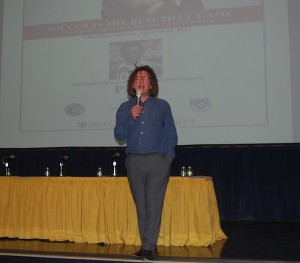For as long as I can remember, soccer in the United States has been referred to as the “sport of the future.” Last week’s “Soccer as a Beautiful Game” international conference at Hofstra University buried this notion once and for all. Hofstra history professors Stan Pugliese and Brenda Elsey did a marvelous job organizing the global conclave.
 I arrived at the largest fútbological congress ever held in the U.S. just in time to hear David Goldblatt’s keynote address. Expecting a brilliant presentation based on his new book on Brazilian futebol, Goldblatt surprised many of us by delivering a democratic populist manifesto for the transformation of the world’s game. Goldblatt’s passionate speech for reform appealed to the suffrage of ordinary fans. (Click here and here to read more about this talk.)
I arrived at the largest fútbological congress ever held in the U.S. just in time to hear David Goldblatt’s keynote address. Expecting a brilliant presentation based on his new book on Brazilian futebol, Goldblatt surprised many of us by delivering a democratic populist manifesto for the transformation of the world’s game. Goldblatt’s passionate speech for reform appealed to the suffrage of ordinary fans. (Click here and here to read more about this talk.)
Energized by Goldblatt’s provocative address, I had to choose which of several enticing but concurrent panels to attend. As a historian, I decided to privilege sessions with historians, Global South topics, and presentations by Football Scholars Forum members. Much like football radio broadcasts of the pre-satellite TV era, many of us kept track of the action unfolding in other panels via the active Twitter back channel (#HUsoccer @HofstraSocConf).
Tag: Pele
The Soccer Conclave
 There may not be any white smoke coming out of the soccer conclave this week at Hofstra University in New York, but little else will be missing from an unprecedented fútbological event featuring presentations by more than 100 scholars, journalists, authors, coaches, and the King of Soccer himself: Pelé.
There may not be any white smoke coming out of the soccer conclave this week at Hofstra University in New York, but little else will be missing from an unprecedented fútbological event featuring presentations by more than 100 scholars, journalists, authors, coaches, and the King of Soccer himself: Pelé.
Historians Brenda Elsey and Stanislao Pugliese are the presiding cardinals of Soccer as the Beautiful Game: Football’s Artistry, Identity and Politics , an international conference hosted by the Hofstra Cultural Center and the Hofstra Department of History. The gathering begins on Thursday, April 10, with concurrent panels, an opening ceremony, and two keynote addresses by David Goldblatt (“Brazil: The Curious Rise of the Futebol Nation”) and Jennifer Doyle (“Imagining a World Without a World Cup: An Abolitionist Perspective).
Friday’s menu serves up a plethora of panels on a dizzying range of topics and a ceremony honoring Pelé with the conferral of an honorary degree. Saturday’s focus is on journalists, coaches, philanthropy round-tables, followed by a concluding plenary session, and . . . a pickup game on the New York Cosmos home ground! (Note to self: remember to pack turf shoes.)
I’ll be presenting a paper comparing World Cup 2010 in South Africa to World Cup 2014 in Brazil (click here to listen to an earlier version of this talk) and also participating in the Football Scholars Forum on academic vs. journalistic writing about soccer (click here to watch my pre-conference video blog and here to read the other five posts by my fabulous co-panelists).
Futebol Nation: The Story of Brazil
The Garrincha of futbology, David Goldblatt, admits he’s neither Brazilian nor a Brazilianist as he begins his recent public lecture at Pitzer College in California.
Then, like Garrincha, he feigns left, goes right through through Brazil’s World Cup history, pivots on slavery, Lusotropicalism and GINI coefficients, does a give-and-go with Mario Filho, dribbles around Benedict Anderson, reaches the Maracanazo touchline, and delivers a cross into the Vinegar Revolt of 2013.
Eduardo Galeano has written that “in the history of soccer no one made more people happy” than Garrincha. It’s not too much of a stretch to say that in the field of futbology the same is true for David Goldblatt.
The Football Atlantic
Driving in Soweto, film maker Dumisani Phakathi talks about the connections between the 1970s American professional soccer league and professional football in South Africa:
He also reflects on next month’s World Cup: